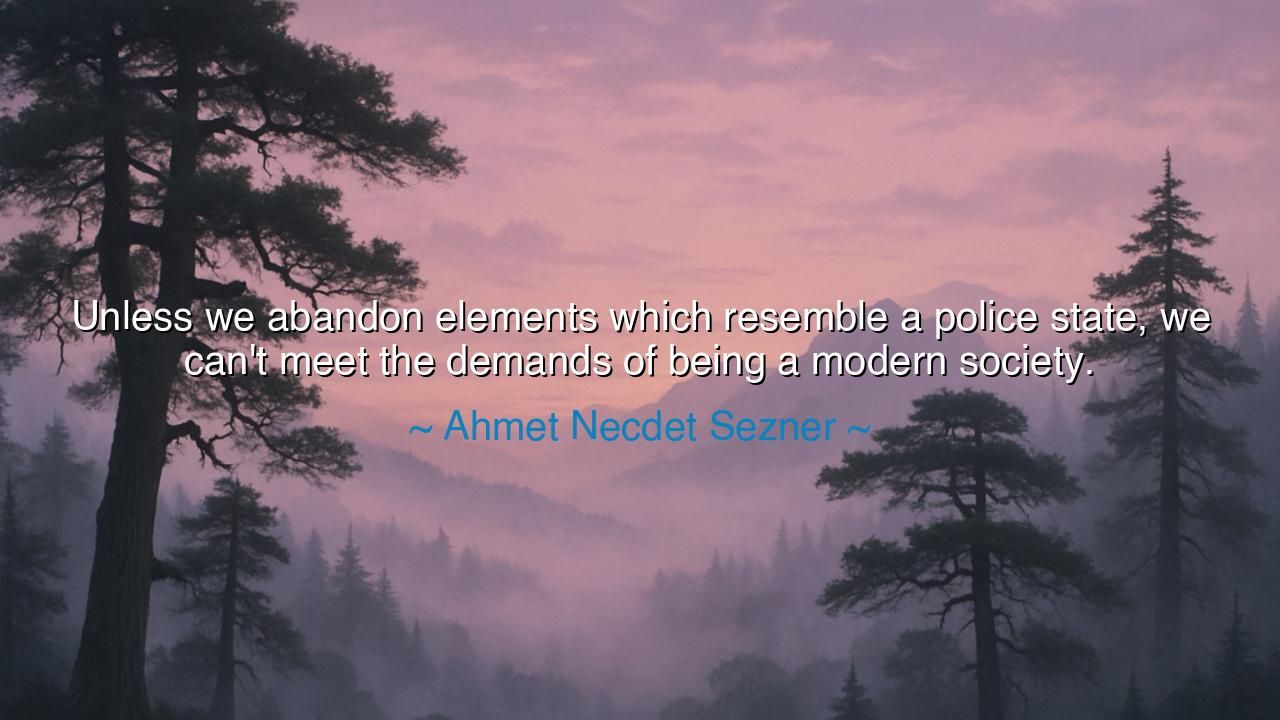
Unless we abandon elements which resemble a police state, we
Unless we abandon elements which resemble a police state, we can't meet the demands of being a modern society.






Ahmet Necdet Sezner’s words fall with the weight of prophecy: “Unless we abandon elements which resemble a police state, we can’t meet the demands of being a modern society.” In these lines lies the eternal struggle between freedom and control, between the heavy hand of authority and the soaring spirit of human progress. The ancients would call this the battle between tyranny and liberty, a contest that has shaped empires and toppled kings. For a modern society cannot flourish when its people live in fear of the very powers meant to protect them. Where there is suspicion, there can be no trust; where there is oppression, there can be no innovation.
The image of a police state is not new. In every age, rulers who sought absolute control have created systems where every whisper is watched, every movement shadowed, every citizen reduced to a subject trembling before authority. Yet such societies, though strong in appearance, are brittle at their core. For progress—the lifeblood of the modern age—requires freedom: freedom to speak, freedom to question, freedom to dream beyond the boundaries imposed by power. Sezner’s warning is thus both political and spiritual: abandon the chains of repression, or remain forever chained to the past.
Consider the story of East and West Berlin after the Second World War. In the East, walls and watchtowers rose, the streets patrolled by secret police. Citizens learned to fear even their neighbors, for an unguarded word might bring punishment. In the West, though far from perfect, there was space for debate, dissent, and experimentation. Over time, the difference grew clear: one side withered beneath control, the other blossomed with innovation and culture. When the Berlin Wall finally fell in 1989, it was not just concrete that crumbled, but the illusion that a society built on fear could endure against the tide of modernity.
Sezner, speaking from the heart of Turkey, knew well the delicate balance between authority and freedom. His warning was not meant only for his nation, but for all who would walk the road of modern civilization. Modern society demands participation, transparency, and the free flow of ideas. It is not enough to silence the people in the name of order, for silence breeds resentment, and resentment grows into rebellion. A government that fears its citizens cannot call itself strong, and a people who cannot speak cannot call themselves free.
The meaning of his words is clear: to abandon the shadows of authoritarianism is not to weaken the state, but to strengthen it. To create a society where citizens need not fear their own protectors is to lay the foundation for trust, for cooperation, for greatness. Just as the ancients learned that a kingdom cannot thrive when ruled only by the sword, so must the modern world learn that progress cannot flourish beneath surveillance and repression.
What, then, shall each listener take from this? First, guard against fear disguised as security. Question laws and systems that strip liberty under the guise of safety. Second, nurture the courage to speak, for silence feeds the roots of oppression. Third, practice vigilance not only against external threats, but against the creeping habits of control within your own society. A modern people must demand not only protection from enemies but protection from the overreach of their own rulers.
So let the teaching endure: “Unless we abandon elements which resemble a police state, we can’t meet the demands of being a modern society.” This is no idle counsel, but a summons to vigilance. The greatness of the future rests not in the iron fist, but in the open hand; not in fear, but in freedom. To preserve liberty is to preserve the flame of civilization itself. Let each generation remember this, and stand watch over their freedom as a sacred trust, lest the shadows return and the promise of modernity be lost.






AAdministratorAdministrator
Welcome, honored guests. Please leave a comment, we will respond soon